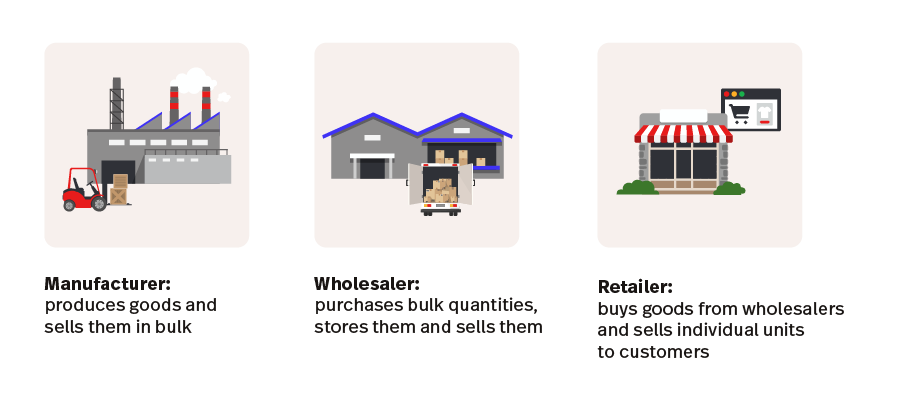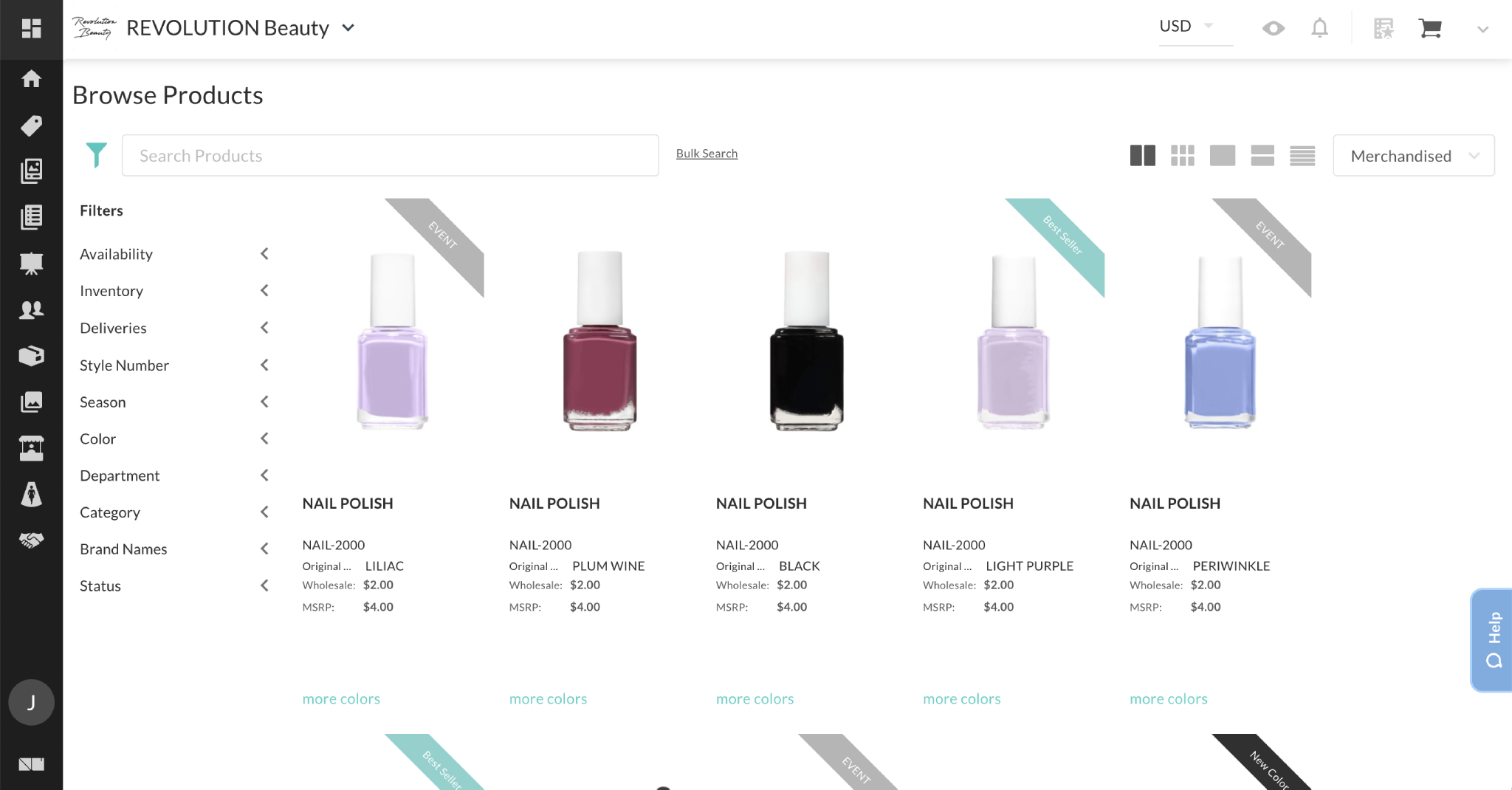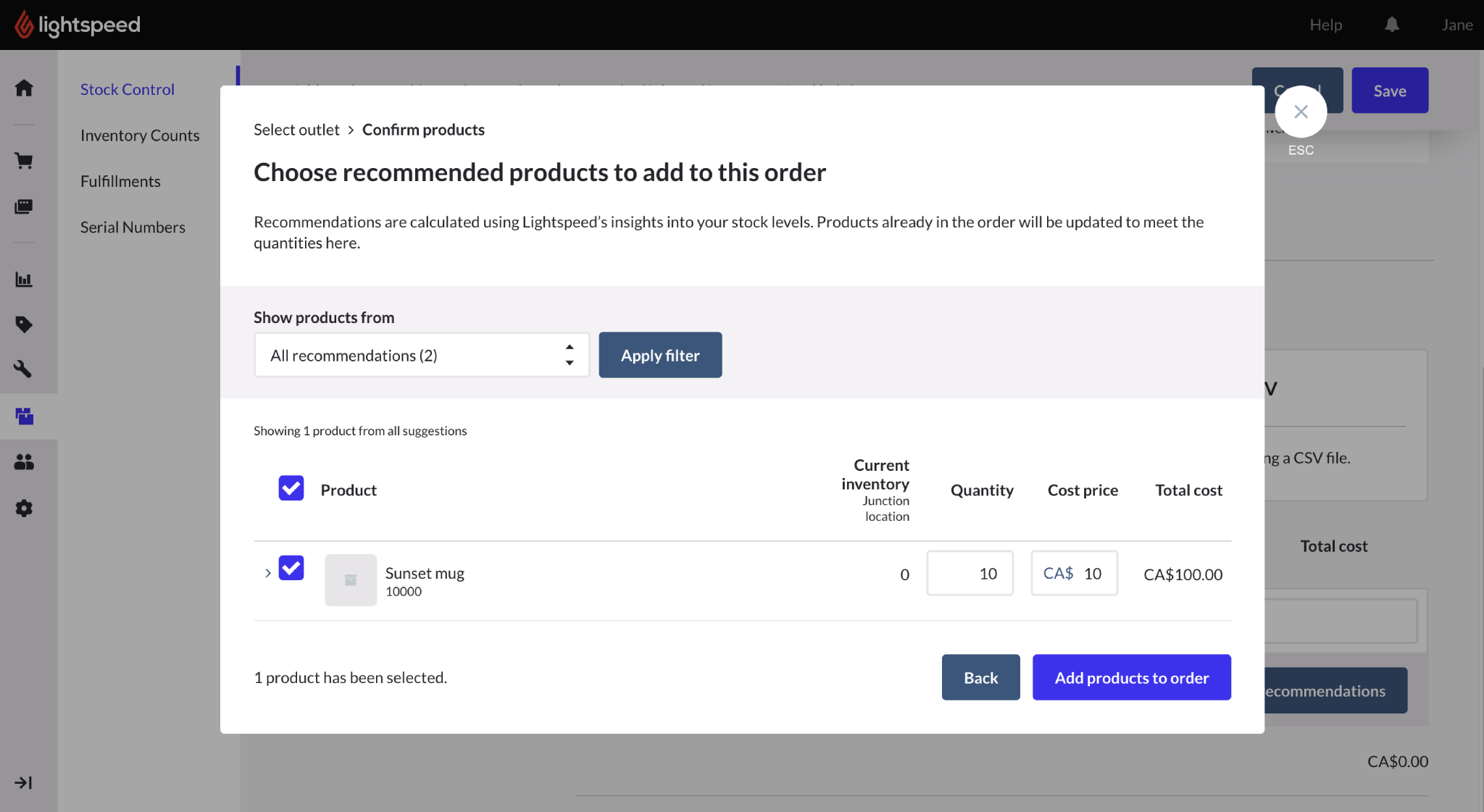
Sourcing inventory is an important part of running a retail or ecommerce business. You need to strike a balance between products that customers want, and that are unique enough to make your business stand out. The price that you pay for inventory affects the prices you set for customers, and therefore your profit margins. By achieving healthy margins, you can have a prosperous business for years to come.
If you’re getting started with your business and are sourcing your initial inventory, you may not know the differences between purchasing inventory from a wholesaler versus sourcing inventory from a retailer.
In this guide to buying inventory wholesale vs. retail, we’re answering your most frequently asked questions, including:
- What’s the difference between wholesale and retail?
- Is it better to buy wholesale or retail?
- How much can you save by buying wholesale?
- Who can buy wholesale products?
- Who makes more of a profit: a wholesaler or a retailer?
- Wholesale vs. retail prices: Why are wholesale prices lower than retail prices?
We hope our answers will guide you toward the best decision for your business.
Our free guide will help you understand the kind of point-of-sale system you need to run your business efficiently.Searching for the right POS system?
Wholesale vs. retail: What’s the difference when it comes to sourcing inventory?
Before we dive into the differences between wholesale and retail, we’re filling you in on what buying wholesale means and what buying retail means when it comes to sourcing inventory.
What is buying wholesale?
Buying wholesale means purchasing products from wholesalers. Wholesalers sell products in bulk, exclusively to other businesses, at lower-than-retail prices. Wholesale businesses can offer these lower prices because of the high volume of sales they receive from their customers.
The businesses that purchase inventory from wholesalers do one of two things with this inventory.
One option is reselling these products at a markup to make a profit. Let’s say you run a quilting supply boutique and purchase 500 spools of white thread from a wholesaler for $250 total. Each spool cost you 50 cents. You markup the spool of thread, factoring in things like your desired profit margin, how much competitors are charging for similar products, and the wholesaler’s suggested retail price. You decide to sell each spool of thread for $3 and make a $2.50 profit on each spool, or an 83% profit margin.
The other thing businesses do with wholesale products is use them to create other products.
For example, let’s say that instead of running a quilting supply boutique, you make and sell homemade quilts. You purchase the inventory you need to make quilts (thread, fabric, batting, etc.) from wholesalers in bulk, then use that inventory to make quilts and sell them at a profit. The materials to make one quilt might cost you $25 wholesale. After factoring in labor costs (let’s say this comes out to $150 per quilt) and competitive pricing, you sell this quilt for $350. You make a $125 profit, or a 50% profit margin.
What is buying retail?
Buying retail means buying products from other retail businesses—like yours—that typically sell goods to the public in small quantities and source their inventory from wholesalers. Retailers markup the wholesale price they paid to purchase their inventory to make a profit, so they can run financially viable businesses.
When you purchase inventory from a retailer, you’re spending more on that item than you would have if you had bought it directly from a wholesaler. In order to price your product competitively, you’ll have a smaller profit margin if you buy retail.
For example, let’s say your quilting supply store sources spools of thread from a big box fabric supply retail store rather than a wholesaler. You purchase one spool of thread for $3 (compared to 50 cents per spool wholesale). Because your competitors sell thread for between $3 and $5, you can’t price your thread higher than that or no one will buy thread from you. So you price your thread at $5 per spool. You earn a $2 profit on each spool, or a 40% profit margin.
Difference between wholesale and retail
The differences between purchasing wholesale inventory and retail inventory come down to price, quantity and access.
Wholesale vs. retail price
Wholesale: Inventory bought through a wholesaler is cheaper than inventory bought through a retailer.
Retail: A retailer’s prices include a markup from the wholesale price, and are therefore higher than wholesalers’ prices.
Wholesale vs. retail quantity
Wholesale: Wholesale businesses typically sell in bulk and are able to offer lower pricing that way. You can typically get a cheaper price per unit as you buy more. Depending on the wholesaler and product, you may need to purchase as few as 10 of each item, or as many as 1,000 to access lower pricing.
Retail: Retailers sell at the same price per item, no matter what quantity you’re buying. They also don’t typically have minimums on how many of their products you need to buy.
Wholesale vs. retail access
Wholesale: You need to prove you’re a business, or work in a specific industry, to be able to buy inventory from a wholesaler.
Retail: Anyone is able to shop retail.
Understanding the supply chain: How wholesale and retail fit in

Both wholesalers and retailers play pivotal roles facilitating the efficient movement and sale of goods throughout the supply chain.
Here’s how it works:
- The supply chain typically begins with the manufacturer, who produces the goods and sells them in large quantities.
- Then, wholesalers typically step in as critical intermediaries. They purchase bulk quantities from manufacturers and store them, which alleviates the need for manufacturers to hold extensive inventory or handle individual sales logistics.
- Retailers who specialize in selling directly to the end consumers buy goods from wholesalers. This distribution method allows retailers to access a broad range of products without the necessity of ordering large volumes, which may be impractical and costly for single retail outlets.
There can be some overlap between the three—some companies, like Nike, act as both retailer and wholesaler, for example. Other companies both manufacture and wholesale their goods.
The role of distributors in the wholesale market
Sometimes there’s a fourth party in the supply chain: a distributor.
Distributors can complement the roles of wholesalers and retailers in the supply chain by offering additional value-added services that enhance the flow of goods from manufacturers to the market. They buy and store products while also taking an active role in the marketing and sales strategies of those products, while wholesalers and manufacturers may be less active in promoting the goods on offer.
Distributors may offer extensive support, such as product training for retail staff, participation in promotional activities and sometimes direct fulfillment services to consumers—think of Costco. This level of involvement helps manufacturers expand their reach and ensures products are effectively tailored and marketed across diverse markets.
Is it better to buy wholesale or retail?
Typically it’s better to source inventory wholesale because you’ll pay less per item. However, there are cases in which you may need to shop retail, such as when you only need a low quantity of a product or need to restock quickly.
For example, it pays off for restaurants to order produce, meats and other ingredients from a wholesale food supplier rather than shopping at the grocery store. Because restaurants go through large quantities of food, wholesalers can offer them large quantities at lower prices than retail.
However, restaurants usually need to place inventory orders in advance, so there’s some waiting involved when ordering wholesale inventory. If a restaurant runs out of an ingredient one day, it’s okay for the team to run to the grocery store to replenish stock until the next bulk shipment arrives.
But, if your business consistently orders less inventory than it needs and you regularly supplement wholesale orders with retail top-ups, this miscalculation will cut into your profit margins. An inventory management solution can help you forecast your inventory needs more accurately and save money.
Wholesalers vs. retailers: How much cheaper is wholesale than retail?
Retail markups vary from industry to industry, so there is no general rule for how much cheaper wholesale is than retail. Look to these industry benchmarks to understand how much you could save by buying wholesale.
| Industry | Average Markup |
| Cell phones | 8-10% |
| Groceries | 15% |
| Jewelry | 50% |
| Restaurants: Food | 60% |
| Clothing | 100-300% |
| Restaurants: Beverages | 500% |
| Pharmaceuticals | 1,000-5,000% |
Source: Chron
Can a regular person buy wholesale?
Wholesalers typically don’t sell to the public. To purchase wholesale, you usually have to prove you own a business by providing an EIN (employer identification number).
Some wholesalers work only with professionals in certain industries, so you may have to prove that you work in a specific trade to get access to bulk pricing for specialty wholesalers. Construction and interior design, for example, are fields that usually offer wholesale access exclusively to professionals in those fields.
Sometimes a wholesaler will let “a regular person” buy from them if they agree to purchase a large quantity.
Who makes more of a profit: wholesalers vs. retailers?
There is no simple answer to the question of who makes more of a profit: wholesalers or retailers. The answer depends on the business’s costs of goods sold (COGS), sales prices and business model.
Wholesalers have to pay for the raw materials to make their products and the manufacturing process (or to acquire the products from manufacturers) and their employees, but then they set their prices and have some control over the market.
Retailers purchase their products for a higher COGS than wholesalers, but retailers can also get away with charging high markups. While retailers don’t have to manufacture products, they still have to pay for staff, commercial space, marketing and more.
Generally speaking, both wholesalers and retailers can make healthy profits when they’re able to keep their cost of goods sold down and prices high. Retailers that have little overhead operating expenses (such as a dropshipping business) are typically successful at achieving high profit margins.
Strategies to negotiate better deals with wholesalers
While shifting to a dropshipping model can help keep overhead operating expenses down, it’s not the only tool at your disposal. Retailers can also adopt several strategies to negotiate better deals with wholesalers, improving buying power and profitability:
- Bulk purchasing: commit to buying in larger quantities to leverage volume discounts. Wholesalers often reduce prices for bulk orders, which can significantly lower the cost per unit.
- Early payments: pay invoices early to potentially secure better deals. Wholesalers value liquidity and may offer discounts to retailers who provide quicker payments.
- Seasonal or off-peak buying: if you can hold inventory for sale later without giving up relevancy, consider planning some purchases during off-peak seasons when demand is lower. Wholesalers might be more willing to negotiate prices to move their inventory during these times.
- Mutual benefits: identify and propose mutually beneficial opportunities. This could include exclusivity in carrying certain products in return for lower prices or marketing support that could help increase the wholesaler’s brand presence.
- Long-term contracts: offer to enter into long-term agreements with wholesalers. This provides the wholesaler with a guaranteed customer over time, and in return, retailers can negotiate lower prices or better terms.
Building long-term relationships with wholesalers
Building long-term relationships with wholesalers can yield numerous benefits, including more favorable pricing, better terms and priority access to new products.
To improve relationships with wholesalers, make sure to:
- Maintain consistent communication: keep open lines of communication, clearly express expectations and provide timely feedback.
- Ensure reliability: build trust by consistently paying on schedule and adhering to agreed terms.
- Stay informed: keep up-to-date with the wholesaler’s product developments and business changes to show commitment.
Successful wholesale and retail partnerships
Collaboration between retailers and wholesalers is pivotal for mutual business success, as it allows for streamlined supply chains, cost reductions, and enhanced market penetration.
For instance, Starbucks and PepsiCo’s partnership in the North American Coffee Partnership to market, sell, and distribute Starbucks ready-to-drink coffee and energy beverages showcases how collaboration can expand market reach and increase product accessibility, benefiting both companies significantly.
Here are a few more case studies we can learn from.
Nike and Foot Locker
As a wholesaler, Nike supplies its range of sports footwear and apparel to retailers like Foot Locker, a major retailer that specializes in athletic shoes.
This partnership allows Foot Locker to offer a wide selection of in demand Nike products, catering to sports enthusiasts and fashion-conscious consumers alike. It means Nike can extend their reach even to places they don’t operate stores, increasing their bottom line without excess operating costs.
Apple and Best Buy
Apple utilizes Best Buy as a key retail partner to distribute its range of products, including iPhones, iPads and MacBooks.
This relationship enables Apple to reach a broader market, leveraging Best Buy’s extensive network of stores across various markets. Because the Apple Store experience is so different to the Best Buy experience, the wholesale partnership doubles Apple’s exposure to customers even when the two share a shopping center.
For Best Buy, carrying Apple products ensures they always have a relevant product on their shelves, even as other product categories like DVDs fall by the wayside.
Sunmed and Your CBD Store franchises
As a wholesaler, Sunmed provides its franchisees with high-quality CBD products. This ensures that the franchisees have access to a competitive product line that adheres to industry standards and regulations, which is essential in a market that values purity and compliance.
In return, each franchisee operating under the Sunmed, Your CBD Store brand benefits from Sunmed’s strong market reputation and proven product efficacy, which help attract and retain customers. This setup allows franchisees to focus more on customer service and less on product sourcing and quality assurance, knowing that Sunmed handles these aspects.
Unsuccessful wholesale relationships: Target and Canadian suppliers
Lessons can also be learned from failed partnerships.
When Target expanded into Canada and partnered with local suppliers, discrepancies in expected service levels and inventory management led to widespread stock issues and ultimately contributed to Target’s exit from the Canadian market.
From this, we can see that retailers need to prioritize transparent negotiations, regular performance reviews and adaptable strategies that accommodate changing market conditions to prevent such failures.
Wholesale vs. retail prices: Why are wholesale prices lower than retail prices?
Wholesale prices are lower than retail prices because retail prices come with a markup. Retailers purchase inventory in bulk from wholesalers, then inflate the price per unit to make a profit on each item they sell.
How technology is changing wholesale and retail
Here are four ways technology is making an impact on the ways retailers procure goods from wholesalers.
Ecommerce platforms and online ordering
Platforms and marketplaces like NuORDER by Lightspeed are revolutionizing how retailers order from wholesalers by providing online catalogs and easy ordering systems.
The NuORDER interface, making reordering as easy as shopping online.
The NuORDER interface, making reordering as easy as shopping online.
This convenience allows retailers to place orders at any time, significantly speeding up the procurement process and reducing the need for physical sales visits.
Data analytics and demand forecasting
Advanced analytics tools enable wholesalers to analyze large datasets, predicting buying trends more accurately. Retailers benefit from this as wholesalers can provide insights and recommendations on optimal stock levels and new product opportunities, helping retailers manage inventory more effectively.
Blockchain for supply chain transparency
Blockchain technology is being integrated to enhance transparency in the supply chain. It helps in tracking the provenance and verifying the authenticity of goods, which is particularly beneficial for retailers dealing in luxury goods or items where authenticity is crucial.
Automated inventory management systems
Automation in inventory management helps both retailers and wholesalers track stock levels in real-time. This integration can help augment reordering processes when stock falls below predetermined levels, ensuring continuous availability and reducing the risk of stockouts.

Lightspeed Retail can recommend reorder amounts to optimize shelves and storage.
The future of wholesale and retail: trends to watch
The future of wholesaling is poised to be shaped by technological advancements and shifting market dynamics.
These trends reflect a move towards more technologically integrated, consumer-focused and ethically conscious wholesaling practices that are likely to dominate the industry in the coming years.
- Sustainable and ethical sourcing: as consumers increasingly demand transparency and sustainability, wholesalers will need to prioritize ethical sourcing practices. This includes sourcing goods that are environmentally friendly, socially responsible and sustainably produced.
- Artificial intelligence and machine learning: AI and machine learning are transforming how wholesalers predict demand and optimize logistics. These technologies can analyze vast amounts of data to forecast trends, automate warehousing operations, and enhance decision-making processes, leading to increased efficiency and reduced costs.
- Increased direct-to-consumer sales: wholesalers are starting to bypass traditional retail channels and sell directly to consumers. This shift is driven by the growth of online platforms and the need for wholesalers to capture greater margins and control over brand messaging.
- Enhanced supply chain collaboration: technology is enabling better collaboration and integration between wholesalers, manufacturers and retailers. Through improved supply chain visibility and shared data platforms, stakeholders can synchronize their operations more effectively, ensuring smoother workflows and reduced redundancies.
Wrapping up: Wholesale vs. retail
Where you source your inventory is a decision you should make with your business’s needs in mind. While wholesale pricing is more attractive than retail pricing, you may end up stocking products that every other competitor also carries. And while retail sourcing can let you A/B test inventory by purchasing in smaller quantities, you’ll end up with lower profit margins due to the higher cost of goods sold.
No matter how you decide to purchase inventory, inventory management software can help you keep an eye on what you have left in stock, when it’s time to reorder, and your profit margins.
Lightspeed’s POS and ecommerce platforms are equipped with all of the inventory management tools you need to run a successful business. Start your free trial today.

News you care about. Tips you can use.
Everything your business needs to grow, delivered straight to your inbox.



![11 Tips To Make Your Pop-Up Shop a Roaring Success [For Retail Store Beginners and Pros Alike]](https://blog-assets.lightspeedhq.com/img/2021/06/2da3ae10-blog-hero_pop-up-shop.jpg)